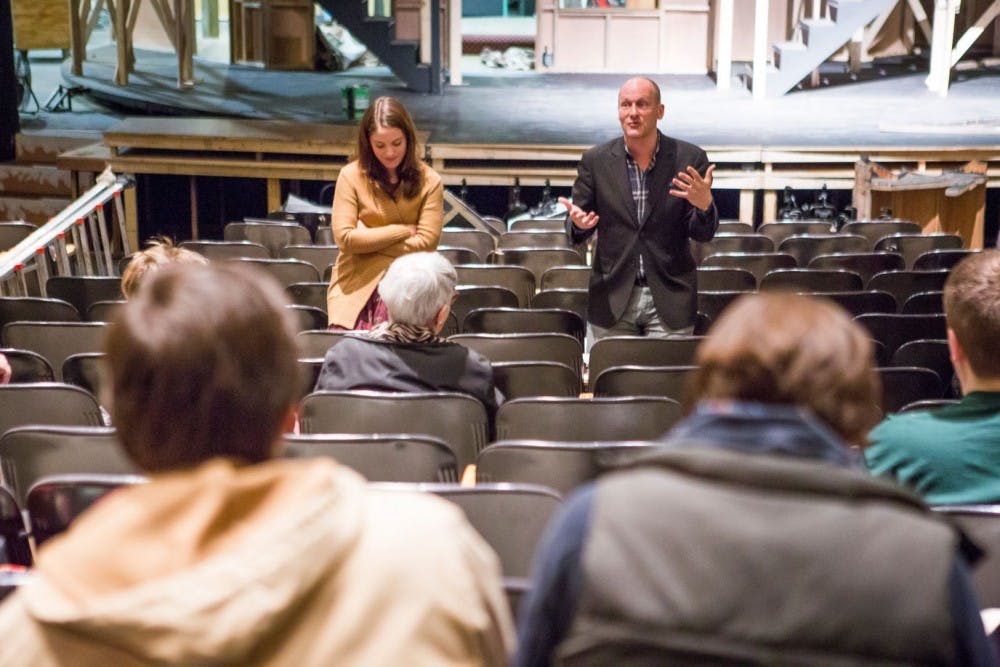As a place for guest speakers, workshops and general announcements, the Division of Theater’s weekly Lunchbag event on Friday is a staple of the department’s culture.
Only one time a week, audience members are allowed to crinkle those wrappers in the Elizabeth Evans Baker Theater in Kantner Hall. Those audience members consist of Division of Theater faculty and students, and the “performance” is Lunchbag.
Lunchbag has been a part of the theater department’s history for a few decades, dating back to about the 1980s with the actual origin date unknown. As it is now, Lunchbag is a free hour in the Division of Theater faculty and students’ schedules in which they sit in Baker Theater and listen to the presentation of the week, which varies between guest speakers, alumni visits, workshops and more.
{{tncms-asset app="editorial" id="5de3ec4a-d706-11e4-92a4-b375ce0542a0"}}
Lunchbag is offered as a zero-credit course. It is recommended everyone attend every week, but attendance is not absolutely mandatory.
“I think of it as forced family fun time,” said Rani Crowe, assistant director of the School of Dance, Film and Theater and current programmer for Lunchbag.
With the different schedules for designers and actors, Alycia Kunkle, a third-year graduate actor who coordinated the Lunchbag programming for the 2013-2014 year, said she likes that Lunchbag provides a place for everyone to touch base and interact.
Maureen Wagner, assistant dean for student services in the College of Fine Arts, coordinated the programming for about 10 years, from 2002 to 2013. Wagner said she cherishes Lunchbag because of the permanent space it created for the students.
"It is there when they need it, and sometimes you don’t realize what you need, but it is there,” Wagner said.
{{tncms-asset app="editorial" id="5f950cde-d663-11e4-aff4-d79fa6987acd"}}
In addition, Robert St. Lawrence, a retired associate professor in the theater department, has been at Ohio University since 1975 and said he feels Lunchbag has become solidified as a part of the department’s culture because of the openness of the programming.
“Theater students surely get locked into what they’re doing right now, and if you let people, they sort of live in Kantner Hall,” he said. “Opening the doors and windows to the rest of the arts community is another goal (of Lunchbag).”
This year’s programming included the traditional discussions about the main stage productions, professors Melissa Haviland and David Colagiovanni’s “Music for Teacups” sound experiment and guest speaker Robert Pullen, an Emmy-nominated producer, whose presentation Kunkle noted as one of her favorite Lunchbag events.
Crowe was an undergraduate student from 1990 to 1992, and in that time, she remembered with a laugh, a “big lighting designer from New York” visited. That lighting designer was Michael Lincoln, who now serves as the artistic director of the Division of Theater. Before social media existed, Crowe added, Lunchbag was the place to learn about parties and fun events.
In addition to the scheduled programs, people make announcements in regard to their need for help with projects, student films, plays and more. Attending Lunchbag creates more opportunities for actors, said Whitney Rich, a junior studying theater performance.
Even with all of the diverse programming, Wagner said one of her favorite Lunchbags is the summer recap at the beginning of each year.
“Those are the sort of conversations that don’t really have a place to exist anywhere else,” she said.
@buzzlightmeryl
mg986611@ohio.edu






